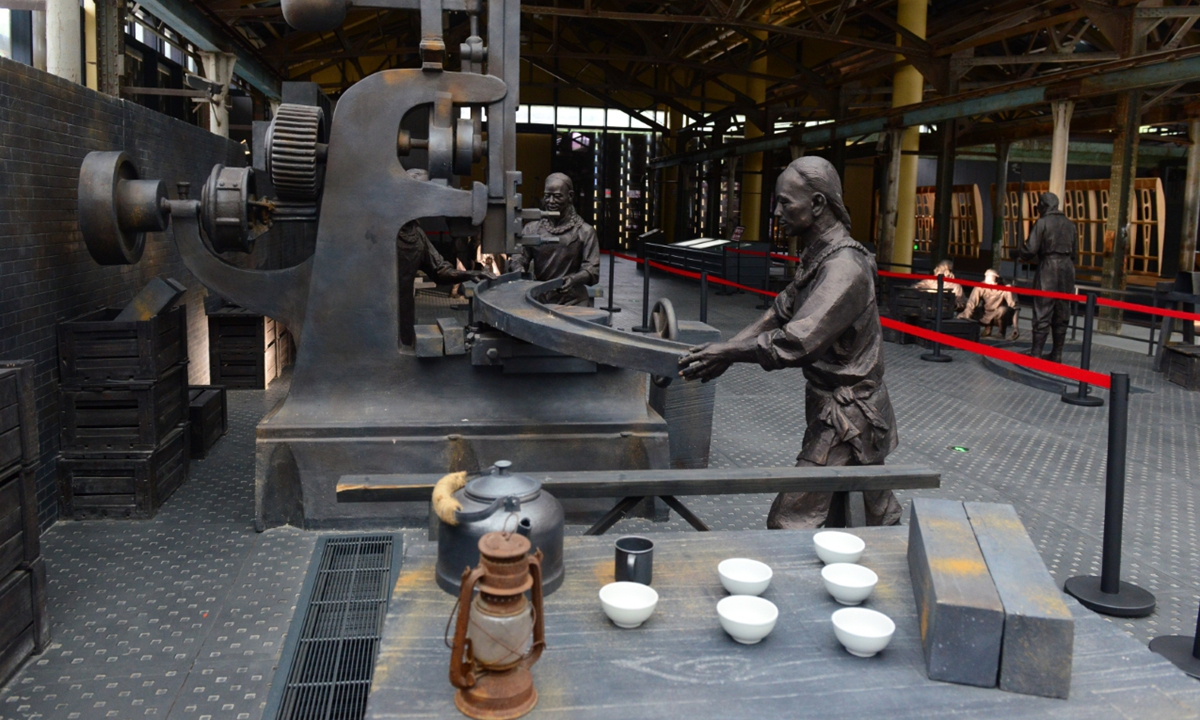
Museum of Foochow Arsenal Photo: VCG
The Museum of Foochow Arsenal in Fuzhou, East China’s Fujian Province is a monument to China’s modern history of shipbuilding, which began to thrive around the middle of the 19th century. The museum has recently embraced a group of special guests from France to highlight its role as a symbol of China-France exchanges over the past more than 150 years.
With numerous photos and industrial relics, the exhibition at the museum introduces stories about the Foochow Arsenal. Including a major dockyard, it was a shipyard construction project started in 1866 that was enhanced by the Qing Dynasty’s (1644-1911) Self-Strengthening Movement.
China established its first large-scale shipyard through the project. Historian Fang Gang told the Global Times that the site reveals the country’s “desire to attain advanced technology and modernization more than a century ago.”
A bust depicting the French naval officer Prosper Giquel is a highlight display at the show. Giquel, who was known in China as Ri Yige, was a main planner on the Chinese project, which allowed him to bring the latest Western engineering resources from Europe to China.
Chen Yue, president of the Mawei Shipyard Culture Research Association, said that Giquel’s participation in the project shed light on how “Western military and industrial technology” was brought to China. The arsenal is located in Fuzhou’s Mawei district.
Giquel took part in the Chinese project when he was 22 years old. During his stay in China, he assisted with prolific inventions, including 15 warships and China’s first steam-powered ship weighing more than 1,300 tons.
Historian Xiang Yangxin told the Global Times that it was said that the Frenchman committed to his job in China not only due to “his expertise and appointed responsibilities,” but also because he was “deeply connected to Chinese culture and the local people.”
Other than devoting himself to engineering projects, Giquel advocated for the formation of a navel school in China related to the Foochow Arsenal program.
Lin Yingyao, a Foochow Arsenal expert, said that according to historical references, researchers discovered that Giquel provided detailed guidance addressing the school’s “curriculum, subjects, teaching and learning processes, student assessments, and so forth.”
Under Giquel’s coordination with overseas organizations, the first batch of Chinese naval students went abroad to countries like the UK and France for study.
These students, including a major in the military, went on to become chief engineers who designed the first ship in modern Chinese history.
“They went to France to explore the road of saving the country through science and technology, but they also realized that Chinese culture should not stand still and instead reach out to the world,” Chen remarked.
Capitalizing on 2024’s 60th anniversary of the establishment of diplomatic relations between China and France, Chinese President Xi Jinping recently published a signed article in the French media outlet Le Figaro. In the article, titled “Carrying Forward the Spirit that Guided the Establishment of China-France Diplomatic Relations, Working Together for Global Peace and Development,” he mentioned the Foochow Arsenal.
“A century ago, a number of young Chinese traveled to France for further education. Some of these young patriots went on to make remarkable contribution to the founding and development of New China. France was also the first major Western country to enter into formal diplomatic ties with New China,” said Xi in his article.
The Giquel sculpture that is on display at the museum was gifted by France’s Ministry for Europe and Foreign Affairs to Fuzhou in 2014 to commemorate the 50th anniversary of diplomatic relations.
“The first exchanges between China and France were not recent, but rooted in history. We have seen that the cultural exchanges between the two countries have been thriving in the past 10 years,” cultural policy expert Song Weiping told the Global Times.
